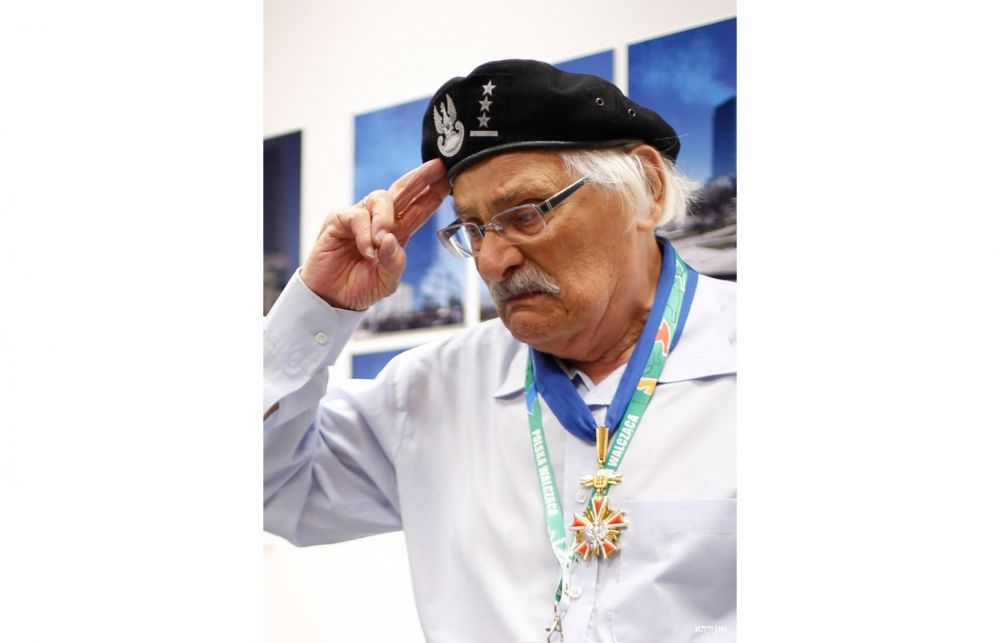- News
- Events
- Oneg Shabbat
- Collections
- Research
- Exhibitions
- Education
- Publishing Department
- Genealogy
- About the Institute
- Bookstore


Samuel Willenberg, a participant in the Warsaw Uprising and the Treblinka Uprising, salutes during his lecture at the Jewish Historical Institute on August 1, 2013 at 5:00 p.m. - the "W" hour when the Warsaw Uprising began on August 1, 1944
“It was a clear afternoon on August 1, 1944. We lived in Warsaw, impressed by the developing offensive of the Red Army. From the east came the roar of cannons and Katyushas. The fiery glow was approaching the capital. I was sitting at home with Hanka and my father as the prolonged roar of the alarm sirens unleashed over the city. At first we thought that they were announcing an air raid. I ran to the window and looked out onto the street. I saw groups of people running quickly along the sidewalks, passers-by in panic, and several silhouettes hurrying towards Koszykowa Street. A few minutes later, shots and the whir of a machine gun rang out nearby.
I was excited and curious. I said goodbye to my father quickly. I also wanted to say goodbye to Hanka, but she insisted that she would accompany me. I got a revolver and two grenades out of the bed. The two of us ran into the street. There was no need to be in conspiracy to guess that an uprising broke out in Warsaw. (...)
We were shot at by the Germans from Róż Avenue. However, the shots were chaotic and inaccurate. We moved along the wall towards the front door. As I approached them, I threw a grenade inside. Immediately after the explosion, our group of six people burst into the hall. I was afraid that we would be under fire – I threw a second grenade. The Ukrainians [or other Eastern soldiers from the Germans’ auxiliary troops; it is not clear whether these where Ukrainians] stopped shooting. We broke into the rooms on the ground floor. On the way, we came across a few dead Ukrainians. I was running with my revolver drawn. At one point, the door of one of the rooms opened. A Ukrainian flew out of it with a rifle in his hand. I fired, the bullet shot into his head, he died on the spot. We still heard the sounds of fighting from the first floor. After a short time there was silence. The insurgents descended from the first floor. We did not believe ourselves that we had obtained the legation without suffering any losses. When we appeared in the windows of the legation, the insurgents on the other side of the street cheered us. Among the cheering people I saw Hanka happily waving her hand.
At that time, the fire from Róż Avenue, in the German district, increased. It was so strong that it was impossible to get out of the building. We obtained a large amount of weapons in the legation, which we wanted to transfer to the other side of the street to the insurgents who were there. We shouted to them to throw a rope for us. After they did, we dropped their weapons from the first floor of the legation. I kept a “sprayer” (submachine gun) for myself. I protected my head with a captured German helmet on the back of which I stuck a white stripe. It was a sign that I was not a German. In the dark of night we left the building we had seized. Other insurgents came to take our place. One of the group I fought in asked who I was. I said that as soon as I realized that the uprising had begun, I joined the closest group of fighters. He told me to report to the commander. When I asked about his whereabouts, I was told that he was wounded and staying in the house at 4 Natolińska Street.
When I entered the room, I saw from a distance that he was busy giving orders to the insurgents surrounding him. As I approached his bed, I recognized the young man who was fighting beside me. He asked me if I belonged to the Home Army. I replied that I was a volunteer. He asked for my pseudonym and surname. I thought for a moment. Then I came to the conclusion that if I eventually fell, it would be better under my own name. I said my name was Samuel Willenberg. Those in the room looked at me inquisitively. Seeing their surprise, I added, “I’m a Jew. I was in Treblinka”.
None of the assembled people said a word. The wounded commander ordered me to be entered on the list of insurgents. Our unit was called the 7th Lodecki Group. (...)
I stood at the station and watched as on the opposite side of [Natolińska] Street flames burst out from all the houses. Suddenly, through the hiss of fire and the smash of breaking windows, the notes of the piano broke through. Someone was playing Chopin’s prelude on the first floor. The sounds of wonderful music spread for a long while, as if the player were not aware of the danger he was facing. The flames were almost reaching the first floor when the last notes were played. Nobody appeared at the window and nobody called for help. The mysterious virtuoso burned without revealing himself to the world.
----
Before the Warsaw Uprising, Samuel Willenberg was a prisoner of Treblinka and a participant in the uprising on August 2, 1943. Tomorrow, at the Treblinka Museum, we will pay tribute to the victims of the extermination camp and the heroic insurgents from 79 years ago. We encourage you to follow the live broadcast of this event!